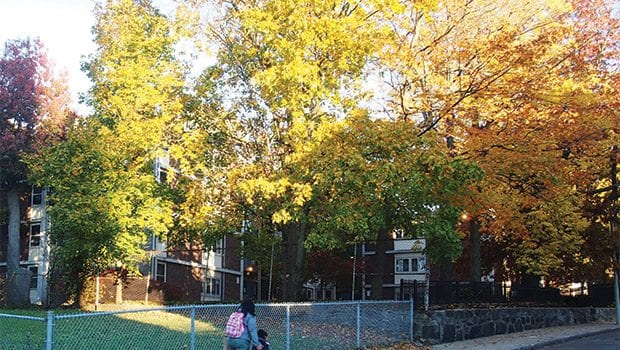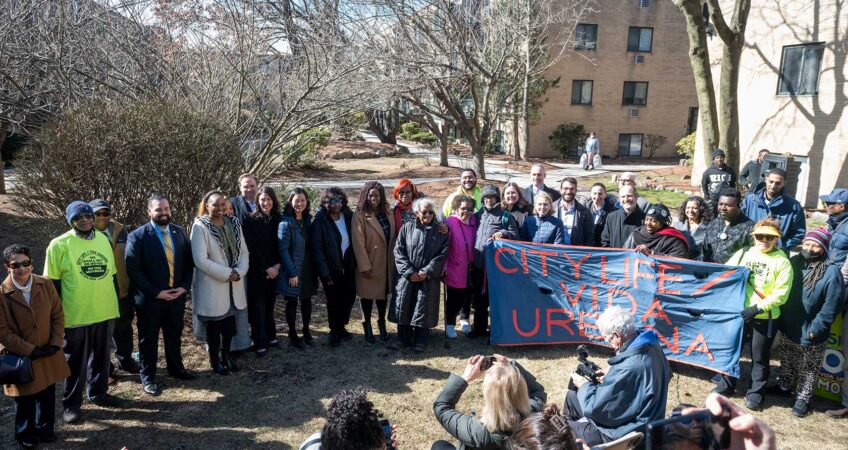
The city of Boston is offering several Roxbury land parcels for sale to developers as part of a pilot Housing Innovation Competition to encourage the creation of “compact” multifamily rental or ownership housing with a range of affordability.
The competition sites, totaling some 23,000 square feet of vacant land, are located in the Garrison Trotter neighborhood at 71–73 Holworthy St., 29–31 Hollander St. and 24 Westminster Ave.
On the web
Housing Innovation Competition: http://bit.ly/2eHNZeX
“Design Standards Set for New Garrison Trotter Housing”: http://bit.ly/2fvIEIw
Development proposals will be judged by the Department of Neighborhood Development (DND), the Boston Planning and Development Agency (BPDA), the Mayor’s Housing Innovation team and the Boston Society of Architects. Entries will be evaluated on a set of criteria including developer experience and capacity as well as design concept, affordability, innovation and project cost feasibility.
Advocating for homeownership
The Garrison Trotter Neighborhood Association is listed as a partner in the request for proposals and press release for the competition.
Louis Elisa, president of GTNA, told the Banner that his group has been involved in defining preferred standards, but he is eyeing the competition and what it may bring with distinct caution.
“We said we’d participate, but we don’t approve of units that don’t take into consideration the needs of families and the need for equity,” he told the Banner. “We’ll say no if it doesn’t meet the standards our association has defined.”
Elisa recounted in an interview how GTNA has worked fiercely on behalf of the Roxbury neighborhood for 39 years. He noted that the group was instrumental the formation of the Franklin Park Coalition and the Blue Hill Avenue Task Force, and that through the years, it has focused firmly on housing — particularly housing that helps people build equity, wealth and a stake in the community.
“We’re asking that they look at ownership possibilities,” he said. “At some point you need to get some equity. They want to do innovative housing, and get more housing built. I say, if you build a house that costs this much, if you’re renting it to me, why not sell it to me? In the long run, there’s a benefit. In the long run with rental, you have nothing.”
Community design standards
In 2015, GTNA worked with the DND to forge a set of residential design principles for the neighborhood as the city of Boston works to ramp up new housing construction. That process generated a set of prototype designs for single-family, two-family and side-by-side duplex homes with porches and gabled roofs, set back a similar distance from the street as existing houses in the area.
The Housing Innovation Competition RFP in some places notes specifically the Garrison Trotter group’s preferences, stating, for example, “We have clearly heard that family units are more desirable.”
In terms of parking, the RFP says, “Though ‘compact living’ principles encourage walking, the use of public transportation, cycling, and the use of shared vehicles such as Zipcar, the Garrison Trotter residents pointed to both the life changes over time such as starting a family and simple demand for visitor parking.” The RFP still calls for design ideas that minimize the need for off-street parking, for instance shared parking strategies.
The competition’s aim is “compact” housing as opposed to “microhousing” — which can mean units less than 450 square feet — but the apparently flexible size guidelines still run small. Applicants are to indicate whether the proposed unit size is smaller or larger than, say, 450 square feet for a studio, 750 square feet for a two-bedroom unit or 950 square feet for three bedrooms. Proposals can be for rental or home ownership.
The DND will sell the properties for $115,000 each to the winners of the competition, according to the RFP.
Elisa said while he is not feeling hopeful that the competition will result in home ownership developments, he is committed to remaining involved.
“If they’re doing innovative programs and ideas, I want to be a part of it. They say we’re partners, and it can’t be in name only. We should have significant input into final decisions.”
Housing Innovation Competition proposals are due Monday, Dec. 19 at 4 p.m. The request for proposals (RFP) is available now for download from the DND website at http://dnd.cityofboston.gov/#page/rfps or for pick-up at the DND Bid Counter at 26 Court St., 10th Floor. An informational event for interested parties will be held Thurs., Nov. 10 from 3:30–5:30 p.m. at the Boston Society of Architects Space at 290 Congress St.






